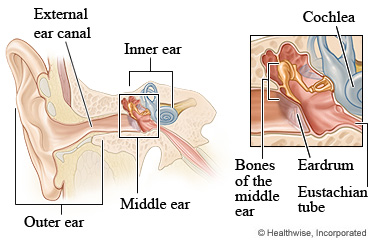
What do your ears do?
Your ears make it possible for you to hear. They are also important in helping you keep your balance.
The ear is made up of the external ear canal, middle ear, and inner ear. The middle ear is separated from the ear canal by the eardrum. The middle ear contains the malleus, incus, and stapes bones, which are also known as the hammer, anvil, and stirrup. The inner ear contains the cochlea, which is the main sensory organ of hearing. The eustachian tube runs from the middle ear to the back part of the nose.
How the ear works
- Sound waves enter the ear through the ear canal and strike the eardrum.
- The eardrum vibrates, and the vibrations move to the bones of the middle ear.
- In response, the bones of the middle ear increase the vibrations and send them to the inner ear.
- The sound vibrations cause the fluid in the inner ear to move, which bends tiny hair cells (cilia) in the cochlea.
- The movement of the hair cells creates nerve impulses, which travel along the cochlear nerve to the brain and are interpreted as sound.
What problems can happen to your ears?
Problems with your ears may include:
- Infection of the middle ear (otitis media).
- Swelling or infection of the ear canal (swimmer's ear).
- Buildup of fluid behind the eardrum (otitis media with effusion).
- Hearing loss.
- Labyrinthitis and BPPV (benign paroxysmal positional vertigo), which are problems in the inner ear. They may cause vertigo. Vertigo makes you feel like you're spinning or whirling.
- Tinnitus, which occurs when you have ringing sounds (or roaring, hissing, buzzing, or tinkling) in your ears.
- A ruptured eardrum. This is a tear or hole in the membrane of the middle ear.
How can you prevent ear problems?
- Blow your nose gently.
- Keep soap and shampoo out of the ear canal. These products can cause itching, which can be mistaken for an ear infection because of the need to scratch or pull at the ears.
- Do not put cotton swabs, bobby pins, or other objects (especially if they are sharp) in the ear canal.
- Limit or avoid exposure to loud music, power tools, gunshots, and heavy machinery. Wear protective earplugs or earmuffs if you cannot avoid loud noises.
- Avoid wearing earplugs too often or for too long. They can irritate your ears.
- Do not use wadded-up tissue or cotton balls. They don't work well.
- Do not smoke or allow others to smoke around you. Smoking may make ear problems more likely. If you need help quitting, talk to your doctor about stop-smoking programs and medicines. These can increase your chances of quitting for good.
- If you wear hearing aids, be sure to follow the recommendations carefully for cleaning and storing them.
Current as of: October 27, 2024
Author: Ignite Healthwise, LLC Staff
Clinical Review Board
All Ignite Healthwise, LLC education is reviewed by a team that includes physicians, nurses, advanced practitioners, registered dieticians, and other healthcare professionals.

